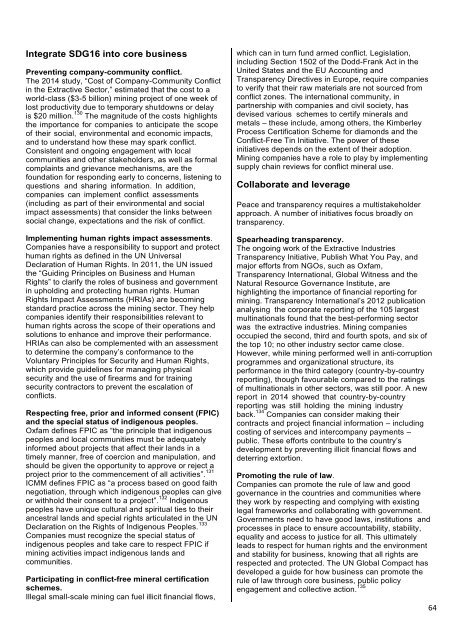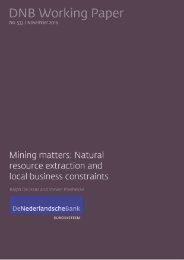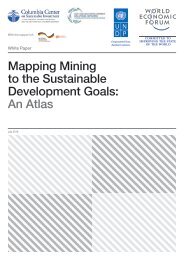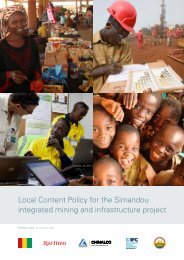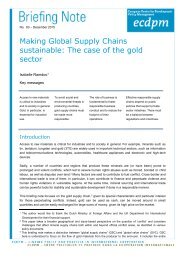Mapping Mining to the Sustainable Development Goals An Atlas
2gpArJN
2gpArJN
Create successful ePaper yourself
Turn your PDF publications into a flip-book with our unique Google optimized e-Paper software.
Integrate SDG16 in<strong>to</strong> core business<br />
Preventing company-community conflict.<br />
The 2014 study, “Cost of Company-Community Conflict<br />
in <strong>the</strong> Extractive Sec<strong>to</strong>r,” estimated that <strong>the</strong> cost <strong>to</strong> a<br />
world-class ($3-5 billion) mining project of one week of<br />
lost productivity due <strong>to</strong> temporary shutdowns or delay<br />
is $20 million. 130 The magnitude of <strong>the</strong> costs highlights<br />
<strong>the</strong> importance for companies <strong>to</strong> anticipate <strong>the</strong> scope<br />
of <strong>the</strong>ir social, environmental and economic impacts,<br />
and <strong>to</strong> understand how <strong>the</strong>se may spark conflict.<br />
Consistent and ongoing engagement with local<br />
communities and o<strong>the</strong>r stakeholders, as well as formal<br />
complaints and grievance mechanisms, are <strong>the</strong><br />
foundation for responding early <strong>to</strong> concerns, listening <strong>to</strong><br />
questions and sharing information. In addition,<br />
companies can implement conflict assessments<br />
(including as part of <strong>the</strong>ir environmental and social<br />
impact assessments) that consider <strong>the</strong> links between<br />
social change, expectations and <strong>the</strong> risk of conflict.<br />
Implementing human rights impact assessments.<br />
Companies have a responsibility <strong>to</strong> support and protect<br />
human rights as defined in <strong>the</strong> UN Universal<br />
Declaration of Human Rights. In 2011, <strong>the</strong> UN issued<br />
<strong>the</strong> “Guiding Principles on Business and Human<br />
Rights” <strong>to</strong> clarify <strong>the</strong> roles of business and government<br />
in upholding and protecting human rights. Human<br />
Rights Impact Assessments (HRIAs) are becoming<br />
standard practice across <strong>the</strong> mining sec<strong>to</strong>r. They help<br />
companies identify <strong>the</strong>ir responsibilities relevant <strong>to</strong><br />
human rights across <strong>the</strong> scope of <strong>the</strong>ir operations and<br />
solutions <strong>to</strong> enhance and improve <strong>the</strong>ir performance.<br />
HRIAs can also be complemented with an assessment<br />
<strong>to</strong> determine <strong>the</strong> company’s conformance <strong>to</strong> <strong>the</strong><br />
Voluntary Principles for Security and Human Rights,<br />
which provide guidelines for managing physical<br />
security and <strong>the</strong> use of firearms and for training<br />
security contrac<strong>to</strong>rs <strong>to</strong> prevent <strong>the</strong> escalation of<br />
conflicts.<br />
Respecting free, prior and informed consent (FPIC)<br />
and <strong>the</strong> special status of indigenous peoples.<br />
Oxfam defines FPIC as “<strong>the</strong> principle that indigenous<br />
peoples and local communities must be adequately<br />
informed about projects that affect <strong>the</strong>ir lands in a<br />
timely manner, free of coercion and manipulation, and<br />
should be given <strong>the</strong> opportunity <strong>to</strong> approve or reject a<br />
project prior <strong>to</strong> <strong>the</strong> commencement of all activities”. 131<br />
ICMM defines FPIC as “a process based on good faith<br />
negotiation, through which indigenous peoples can give<br />
or withhold <strong>the</strong>ir consent <strong>to</strong> a project”. 132 Indigenous<br />
peoples have unique cultural and spiritual ties <strong>to</strong> <strong>the</strong>ir<br />
ancestral lands and special rights articulated in <strong>the</strong> UN<br />
Declaration on <strong>the</strong> Rights of Indigenous Peoples. 133<br />
Companies must recognize <strong>the</strong> special status of<br />
indigenous peoples and take care <strong>to</strong> respect FPIC if<br />
mining activities impact indigenous lands and<br />
communities.<br />
Participating in conflict-free mineral certification<br />
schemes.<br />
Illegal small-scale mining can fuel illicit financial flows,<br />
which can in turn fund armed conflict. Legislation,<br />
including Section 1502 of <strong>the</strong> Dodd-Frank Act in <strong>the</strong><br />
United States and <strong>the</strong> EU Accounting and<br />
Transparency Directives in Europe, require companies<br />
<strong>to</strong> verify that <strong>the</strong>ir raw materials are not sourced from<br />
conflict zones. The international community, in<br />
partnership with companies and civil society, has<br />
devised various schemes <strong>to</strong> certify minerals and<br />
metals – <strong>the</strong>se include, among o<strong>the</strong>rs, <strong>the</strong> Kimberley<br />
Process Certification Scheme for diamonds and <strong>the</strong><br />
Conflict-Free Tin Initiative. The power of <strong>the</strong>se<br />
initiatives depends on <strong>the</strong> extent of <strong>the</strong>ir adoption.<br />
<strong>Mining</strong> companies have a role <strong>to</strong> play by implementing<br />
supply chain reviews for conflict mineral use.<br />
Collaborate and leverage<br />
Peace and transparency requires a multistakeholder<br />
approach. A number of initiatives focus broadly on<br />
transparency.<br />
Spearheading transparency.<br />
The ongoing work of <strong>the</strong> Extractive Industries<br />
Transparency Initiative, Publish What You Pay, and<br />
major efforts from NGOs, such as Oxfam,<br />
Transparency International, Global Witness and <strong>the</strong><br />
Natural Resource Governance Institute, are<br />
highlighting <strong>the</strong> importance of financial reporting for<br />
mining. Transparency International’s 2012 publication<br />
analysing <strong>the</strong> corporate reporting of <strong>the</strong> 105 largest<br />
multinationals found that <strong>the</strong> best-performing sec<strong>to</strong>r<br />
was <strong>the</strong> extractive industries. <strong>Mining</strong> companies<br />
occupied <strong>the</strong> second, third and fourth spots, and six of<br />
<strong>the</strong> <strong>to</strong>p 10; no o<strong>the</strong>r industry sec<strong>to</strong>r came close.<br />
However, while mining performed well in anti-corruption<br />
programmes and organizational structure, its<br />
performance in <strong>the</strong> third category (country-by-country<br />
reporting), though favourable compared <strong>to</strong> <strong>the</strong> ratings<br />
of multinationals in o<strong>the</strong>r sec<strong>to</strong>rs, was still poor. A new<br />
report in 2014 showed that country-by-country<br />
reporting was still holding <strong>the</strong> mining industry<br />
back. 134 Companies can consider making <strong>the</strong>ir<br />
contracts and project financial information – including<br />
costing of services and intercompany payments –<br />
public. These efforts contribute <strong>to</strong> <strong>the</strong> country’s<br />
development by preventing illicit financial flows and<br />
deterring ex<strong>to</strong>rtion.<br />
Promoting <strong>the</strong> rule of law.<br />
Companies can promote <strong>the</strong> rule of law and good<br />
governance in <strong>the</strong> countries and communities where<br />
<strong>the</strong>y work by respecting and complying with existing<br />
legal frameworks and collaborating with government.<br />
Governments need <strong>to</strong> have good laws, institutions and<br />
processes in place <strong>to</strong> ensure accountability, stability,<br />
equality and access <strong>to</strong> justice for all. This ultimately<br />
leads <strong>to</strong> respect for human rights and <strong>the</strong> environment<br />
and stability for business, knowing that all rights are<br />
respected and protected. The UN Global Compact has<br />
developed a guide for how business can promote <strong>the</strong><br />
rule of law through core business, public policy<br />
engagement and collective action. 135<br />
64


